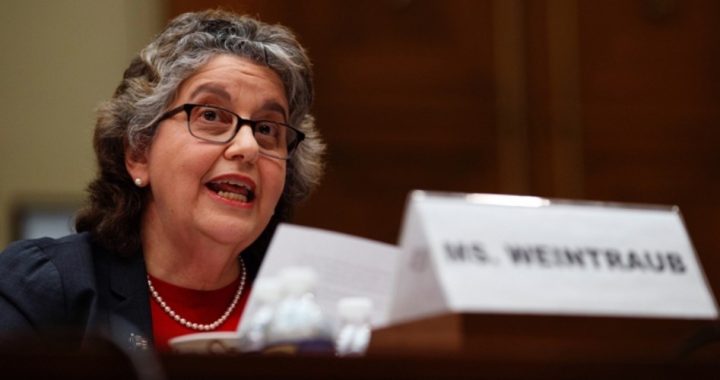
Podcast: Play in new window | Download ()
Subscribe: Android | RSS | More
“The FEC [Federal Election Commission] has no business policing the truth or accuracy of speech of any kind by American citizens on the internet,” said Lee Goodman, a former chairman of the FEC, last week in response to the announced plan by Ellen Weintraub (shown), who now chairs the FEC, to conduct a “symposium” this month with the goal of identifying “effective policy approaches and practical tools that can minimize the disruption and confusion sown by fraudulent news and propaganda in the 2020 campaign.”
Weintraub’s planned symposium has created concern among online conservative media outlets that they can expect government censorship on the Web leading up to next year’s elections.
Goodman is a Republican, and this is not the first time that he has expressed concern that liberals, such as Weintraub, have used the government to target conservative media in the past, and can be expected to repeat that censorship in the future.
Goodman said he opposes censoring any media outlet, and sees Weintraub’s summoning of tech giants such as Google, Facebook, and Twitter to her symposium as an effort to get them to police conservative websites. “I concluded that conservative speakers and press would always be held to a double standard if government got to regulate them. Now the hook to get Drudge [referring to Matt Drudge’s news-aggregator site Drudge Report] is something vaguely defined as ‘disinformation,’ however that might be defined.”
“The FEC has no business regulating the internet or browbeating internet platforms to censor American citizens,” Goodman insisted.
Goodman probably has good reason to be concerned about Weintraub’s intentions. An activist Democrat, Weintraub challenged President Donald Trump’s assertion that voter fraud in New Hampshire cost him that state in the 2016 presidential election, and also caused the narrow defeat of Senator Kelly Ayotte, a fellow Republican. Using FEC letterhead, Weintraub dismissed Trump’s assertion in February 2017: “The scheme the president of the United States alleges would constitute thousands of felony criminal offences under New Hampshire law.”
Weintraub’s interjection of herself into the dispute led the group Cause of Action to call for her to be investigated for ethics violations. Cause of Action is funded by the Koch Brothers. Weintraub defended her remarks by saying that the violations alleged by President Trump would be a violation of federal campaign laws, and therefore within her field of jurisdiction.
Of course, making a public statement on an alleged violation of federal laws without first conducting any investigation into Trump’s charges would seem to reveal that Weintraub is speaking more from her position as a partisan Democrat rather than as an objective chair of the FEC.
Weintraub is married to Bill Dauster, who has worked for two Democratic U.S. senators, Chris Van Hollen and Russ Feingold. Feingold was a senator from Wisconsin who co-authored the notorious McCain-Feingold law, which was designed to regulate political speech in the United States.
Weintraub claims that her September event is a reaction to the alleged efforts of the Russian government to influence the 2016 presidential election. The event will be co-hosted by PEN America, a group that has been highly critical of Trump for his criticisms of the liberal media.
Goodman argues that the symposium is beyond the scope of the FEC’s jurisdiction. He said if someone needs to investigate fake news emanating from a foreign government, it should be the FBI, not the FEC. “The FEC’s only role is prohibiting foreigners from spending money to influence American elections, and foreign propaganda should be policed by the FBI and the Department of Justice.”
Such efforts to use agencies of the federal government to regulate political speech are not new in the United States, in spite of the clear wording of the First Amendment. For example, the Fairness Doctrine was used for years by the U.S. Federal Communications Commission (FCC) to require the holders of broadcast licenses to present both sides of controversial issues of public importance. The FCC said such coverage had to be honest, equitable, and balanced. The effect of the ruling on radio was to essentially remove any sort of political commentary from the radio airwaves, replacing it with music, sports, garden shows, and home improvement programs.
In 1987, during the administration of President Ronald Reagan, his appointees eliminated the rule, opening the airwaves to the phenomena of conservative talk radio, led by such personalities as Rush Limbaugh.
In the vote to rescind the Fairness Doctrine, which passed 4-0, FCC Chairman Dennis Patrick said, “We seek to extend to the electronic press the same First Amendment guarantees that the print media have enjoyed since our country’s inception.”
With Democrat Ellen Weintraub attempting to use her position as chair of the FEC to influence Web-based news during the 2020 election cycle, it is quite clear that efforts to shut down views contrary to those held by liberals are ongoing.
Photo: AP Images
Steve Byas is a university history and government instructor, and author of three books. He may be contacted at [email protected]



